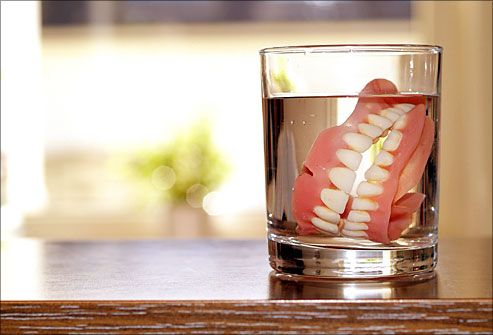Denture Advice and Care Instructions
Speech
It’s common to experience difficulty speaking with your new dentures and you may find it difficult to pronounce words containing ‘S’ sounds. This will improve with time and practice speaking or reading aloud, this helps the mouth adapt to the new set of dentures
Understand
That it’s very important for you oral health to keep dentures spotlessly clean to prevent the gums being red and sore.
Rinse & Brush
Dentures must be rinsed with cool water after every meal and you must remember to rinse your mouth out too!
Do not rinse dentures with hot or boiling water. Every morning and night dentures need brushed with a soft toothbrush using denture toothpaste or alternatively household washing up liquid and water.
*DO NOT USE TOOTHPASTE, BLEACH OR ABRASIVE CLEANERS*
Brush you dentures over a sink filled with water; if they slip out of your hand or fall the denture has less chance of breaking.
Storage
It’s important to let your gums replenish; remove your denture at night. Keep them in a lidded plastic box with cool water.
Remember it will take time and patience to adapt to wearing dentures. If you experience any problems such as sore spots, looseness and breaks in your dentures please return the dentures to us. Do not try to repair dentures yourself!
Discomfort
It’s normal for dentures to cause discomfort and sort spots, after 1 week you should come back to us to see if any adjustments need made.
Eating
Dentures are not anchored to your bone, which means they will move in your mouth when eating; it is important to allow time to adapt to eating.
1st – learn to swallow: start with soft easy foods; mashed potatoes, soup, eggs, ice cream.
2nd – learn to chew: begin by cutting all food into bite size chunks not forgetting to chew on both sides as this will help to balance your plate.
3rd – bite off food: avoid biting into foods such as apples and corn, these must be sliced first. Avoid sticky foods and very hot foods and beverages. Dentures decrease temperature sensation and can cause burns.
New
To begin dentures feel very different from your natural teeth; they may feel bulky and odd. Remember dentures are new to your mouth and may take some getting used to and allow TIME to adapt and get used to wearing your dentures.
Excess Saliva
You may experience excess saliva flow with new dentures; this is common and will return to normal within a few days

